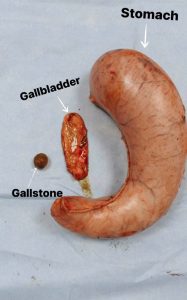Bariatric surgery has grown in popularity as a weight loss intervention for individuals with morbid obesity. Procedures like the gastric sleeve and gastric bypass have been proven to help patients shed significant weight, improve or even resolve comorbidities such as Type 2 diabetes and hypertension, and enhance their overall quality of life. However, as with any medical procedure, bariatric surgeries are not without potential complications. One of the lesser-discussed but fairly common issues that can arise after weight loss surgery is the formation of gallstones.
Gallstones are small, hard deposits that form in the gallbladder, a small organ situated beneath the liver. These stones can range in size from a grain of sand to a golf ball. Gallstones are primarily made up of cholesterol, bilirubin (a byproduct of red blood cells), or a combination of the two. They can lead to a variety of symptoms, from moderate discomfort to severe pain, and can even become life-threatening if they obstruct the bile ducts.

There is a noticeable increase in the risk of gallstone formation following rapid weight loss, and bariatric surgeries often lead to quick and significant weight reduction. Here are some reasons why:
While many individuals with gallstones may remain asymptomatic, others might experience symptoms like:
If you experience any of these symptoms, especially after bariatric surgery, it’s essential to consult with a healthcare provider.

There are several strategies that can be employed to prevent gallstone formation or manage them if they occur:
Gradual Weight Loss: Even though rapid weight loss is a hallmark of bariatric surgeries, it’s essential to adhere to the recommended dietary and exercise guidelines. A steady, gradual weight loss can reduce the risk of gallstones.
Ursodeoxycholic Acid: Some physicians might prescribe this bile acid to patients after bariatric surgery. It helps prevent gallstone formation by reducing cholesterol content in the bile.
Gallbladder Monitoring: Regular check-ups post-surgery can help detect gallstones early. If you’ve had bariatric surgery, your doctor might schedule routine ultrasounds to keep an eye on your gallbladder.
Cholecystectomy: If gallstones become problematic, the most effective treatment is to remove the gallbladder entirely. This procedure, known as a cholecystectomy, can often be done laparoscopically, which reduces recovery time and scarring.
While the benefits of bariatric surgery are profound, being aware of potential gallstone formation, is crucial. By maintaining regular post-surgery check-ups, patients can effectively manage and mitigate these complications.
Remember, every individual’s journey is unique. While some may develop gallstones, many won’t. The key is to stay informed, stick closely to post-operative recommendations, and maintain an open line of communication with your healthcare provider.
Whether you’re considering bariatric surgery or are in the post-operative phase, being proactive in your healthcare can go a long way. Gallstones, while a potential complication, are manageable with the right knowledge and care.

To know more information about Gastric Sleeve Surgery, Gastric Bypass Surgery or other type of bariatric surgeries and symptoms, follow us on Tiktok, Instagram or join our support group on Facebook.
We will provide you with immediate follow-up!
In order to offer you the method that best suits your needs, it is crucial for us to have knowledge of your medical history.
Please complete the following detailed health questionnaire with as much information as possible.
This will help us get to know you better.
©2023 Dr. Luis Pasten | Overweight Reduction Center | All Rights Reserved.